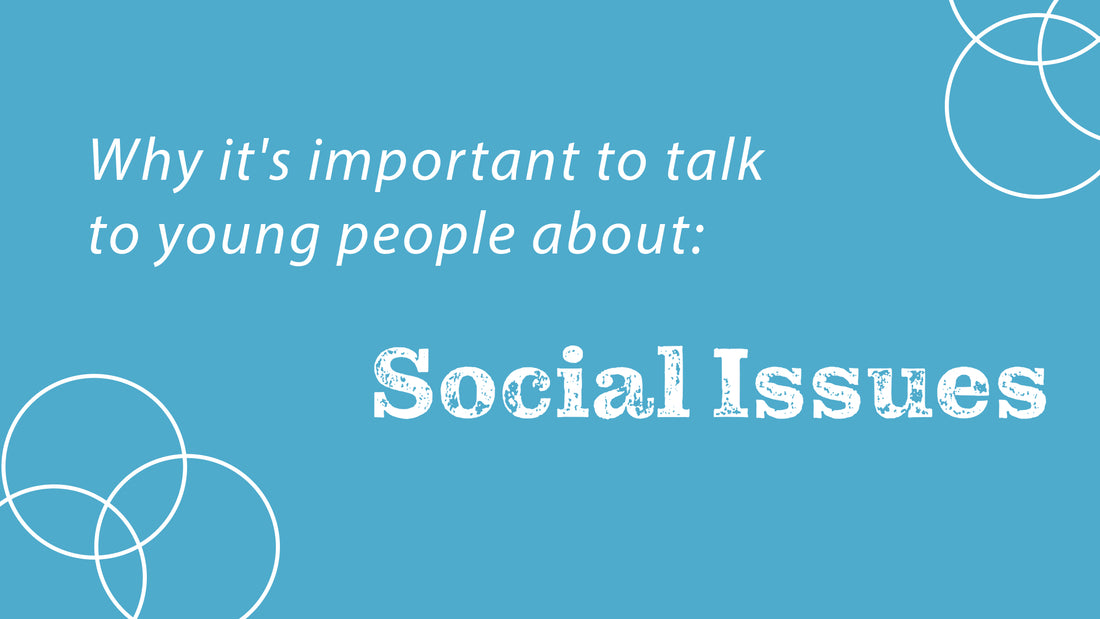
Why is it important to talk to young people about Social Issues?
Teenage life is a time of immense growth, change, and transition. Each generation of young people faces new challenges and society pressures, along with struggles that are common to the generation before.
Today teenagers are navigating a complex world of evolving technology, life online, a post-pandemic world - issues that impact both their personal lives, and wider society.
What are social issues?
First coined by sociologists and philosophers in the 19th century who referred to it as the social problem, social issues are problems that effect individuals, groups, or the wellbeing of communities in society. They often spark public discussion or disagreement about their cause and solutions.
Social issues are anything from relationships, healthcare, education, to discrimination, digital safety, and food insecurity – issues that touch every corner of life.
Here’s a few reasons why we believe it’s vital to discuss these topics with young people:
- Support their mental health
Understanding social issues can have a direct impact on a young person's well-being. Being aware of how the world around them works, including the struggles others face, can help them make sense of their own experiences and feel less isolated.
- Develop key skills
Teaching young people about social issues equips them with essential skills they can use throughout life, such as critical thinking. It encourages them to analyse information, distinguish between facts and misinformation, challenge assumptions, and form their own opinions. Understanding complex topics also broadens their horizons and enhances their problem-solving skills.
- Keep them informed and empowered
Avoiding difficult conversations does more harm than good. The more students know about the issues that affect them, the better they are at making informed decisions, protecting themselves, and seeking help when necessary. Keeping them in the dark only leaves them vulnerable.
- Normalise tough conversations
Many topics can be uncomfortable or difficult to discuss, especially for teenagers. However, by encouraging open and honest conversations, we can help normalise these discussions, allowing young people to see that there is nothing to be embarrassed about. It also allows them to participate in important conversations that they may otherwise feel excluded from.
- Build empathy
It might not always be easy to find a connection to people we consider different from ourselves. However, talking about issues that can affect anyone, or deepening our understanding of how issues affect other people, can help us to build empathy and respect, even for those with differing opinions that our own. Understanding different perspectives and building empathy is critical for creating a more inclusive and compassionate society.
- Find their voice
By engaging in conversations about social issues, young people learn how to articulate their thoughts, opinions, and emotions effectively. This empowers them to stand up for themselves and others, becoming advocates for the changes they want to see in the world.
- Challenge injustice and advocate for change
Talking about social issues can inspire young people to challenge injustice and take a stand against inequality. They become more aware of how systems work and how they can contribute to reshaping those systems to be fairer and just.
- Change the world!
Ultimately, by learning about and discussing social issues, young people are empowered to be the change-makers of tomorrow. They can actively contribute to making the world a better place, advocating for social justice, and creating a brighter future for all.
Educating young people about social issues isn’t just important—it’s essential. It provides them with the knowledge, skills, and empathy needed to navigate the complexities of the modern world. By empowering them to engage with challenging topics, we not only support their personal growth but also contribute to a more informed, empathetic, and just society.
